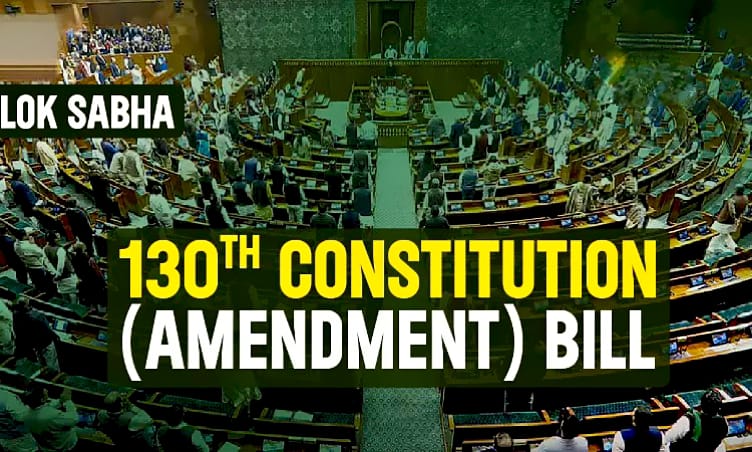The Lok Sabha has referred the 130th Constitution (Amendment) Bill to a Joint Parliamentary Committee (JPC) for detailed scrutiny. Introduced earlier today, August 20, 2025, by Home Minister Amit Shah, the bill proposes the removal of Central or State Ministers—including the Prime Minister and Chief Ministers—if they are arrested and detained for 30 consecutive days on charges carrying a minimum five-year imprisonment. Alongside this, two additional bills amending the Government of Union Territories Act, 1963, and the Jammu and Kashmir Reorganisation Act, 2019, were also tabled and sent to the JPC.
130th Constitution Amendment Bill 2025.

The motion to introduce these bills faced fierce opposition from prominent leaders such as Asaduddin Owaisi (AIMIM), Manish Tewari (INC), NK Premchandran (RSP), KC Venugopal (INC), and Dharmendra Yadav (SP). Despite the protests, the bills passed through a voting process, with a separate motion to refer them to the JPC also approved. The JPC comprises 21 Lok Sabha members and 10 Rajya Sabha members, tasked with reviewing the proposals.
Key Provisions of the Bills
Collectively, the three bills aim to empower the President, Governors, or Lieutenant Governors to remove Ministers from Central, State, or Union Territory offices if they remain jailed for 30 days due to serious offence allegations. The 130th Constitution (Amendment) Bill specifically introduces a new clause to Article 75, governing Central Ministers, stating:
“A Minister, who for any period of thirty consecutive days during holding the office as such, is arrested and detained in custody, on allegation of committing an offence under any law for the time being in force, which is punishable with imprisonment for a term which may extend to five years or more, shall be removed from his office by the President on the advice of the Prime Minister to be tendered by the thirty-first day, after being taken in such custody.”
If the Prime Minister fails to advise the President by the 31st day, the Minister will automatically lose office the next day. However, the clause allows reappointment after release from custody. Similar amendments are proposed for Article 164 (State Ministers) and Article 239AA (NCT of Delhi), with corresponding changes to the Government of Union Territories Act and the Jammu and Kashmir Reorganisation Act to extend the rule to Union Territories. For a deeper dive into constitutional amendments, visit our Indian Constitution updates.
Rationale and Context
The Statement of Objects and Reasons for the 130th Constitution (Amendment) Bill emphasizes that Ministers should remain above “any ray of suspicion” and prioritize public welfare. It argues that a detained Minister accused of serious crimes “may thwart or hinder the canons of constitutional morality and principles of good governance, eventually diminishing the constitutional trust reposed by people in him.” This legislative push follows recent high-profile arrests of Ministers, including former Delhi Chief Minister Arvind Kejriwal (Delhi Liquor Policy scam), former Tamil Nadu Minister V Senthil Balaji (TN Cash-for-Jobs scam), Jharkhand Chief Minister Hemant Soren (land scam), and former West Bengal Education Minister Partha Chhatterjee (WB recruitment scam), all facing charges like money laundering and corruption.
While most have been granted bail with cases pending, Senthil Balaji’s case stands out. Removed by the Tamil Nadu Governor after his arrest, he was reinstated post-bail. However, when his bail cancellation was sought, the Supreme Court expressed concern over his reinstatement, urging him to choose between his post and liberty. Balaji resigned, and the Court declined to cancel his bail, highlighting judicial oversight in such matters. For more on recent political developments, check our India politics news.
Political Reactions and Implications
The opposition’s resistance reflects concerns over the bill’s potential misuse. Owaisi and others argue it could destabilize elected governments, especially with central agencies allegedly targeting opposition leaders. The JPC referral, however, allows for broader consultation, with a report due by the next winter session. This move could shape India’s political landscape, balancing accountability with democratic principles.
The bill’s context ties to ongoing debates about criminalization in politics. Kejriwal’s six-month jail stint, Soren’s detention, and Chhatterjee’s arrest have fueled public and judicial scrutiny. The Supreme Court’s stance on Balaji suggests a need for clear legal frameworks, which this amendment seeks to address. Social media buzz on X shows a split—some hail it as a “step toward clean governance,” while others call it a “tool for political vendettas.”
Broader Impact and Future Outlook
If passed, the amendment would set a precedent for automatic removals, impacting ministerial tenure and public trust. The JPC’s review will consider safeguards against arbitrary enforcement, a key opposition demand. The inclusion of Union Territories and Jammu and Kashmir ensures uniformity, though regional political dynamics may complicate implementation.
The next 48 hours will see intense parliamentary debates, with the JPC’s composition—21 from Lok Sabha, 10 from Rajya Sabha—offering a diverse perspective. The outcome could influence future governance models, especially with elections looming. For live updates, follow our breaking news section.
This bill, introduced amid Mumbai’s rain chaos and global attention, underscores India’s evolving legal landscape. As the JPC deliberates, the nation watches closely.